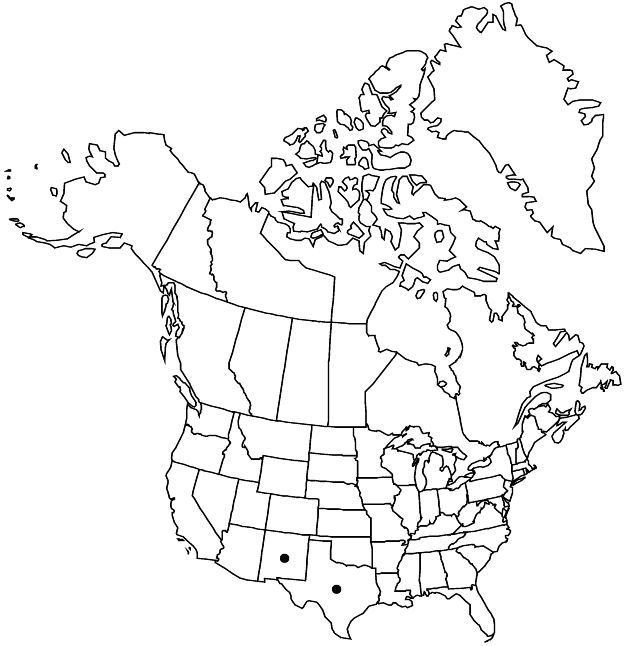Difference between revisions of "Rosa stellata subsp. mirifica"
Ann. Missouri Bot. Gard. 52: 111. 1965.
FNA>Volume Importer |
FNA>Volume Importer |
||
| Line 19: | Line 19: | ||
|name=Hesperhodos mirificus | |name=Hesperhodos mirificus | ||
|authority=(Greene) Cockerell | |authority=(Greene) Cockerell | ||
| − | }}{{Treatment/ID/Synonym | + | }} {{Treatment/ID/Synonym |
|name=R. stellata var. mirifica | |name=R. stellata var. mirifica | ||
|authority=(Greene) Cockerell | |authority=(Greene) Cockerell | ||
| − | }}{{Treatment/ID/Synonym | + | }} {{Treatment/ID/Synonym |
|name=R. vernonii | |name=R. vernonii | ||
|authority=unknown | |authority=unknown | ||
| Line 40: | Line 40: | ||
|elevation=1700–2300 m | |elevation=1700–2300 m | ||
|distribution=N.Mex.;Tex. | |distribution=N.Mex.;Tex. | ||
| − | |discussion=<p>Subspecies mirifica occurs to the east of subsp. stellata in the Sacramento and White mountains of Otero County, New Mexico, to Culberson and Hudspeth counties in the Guadalupe and Eagle mountains of western Texas, where it is found on Permian limestone.</p><!-- | + | |discussion=<p>Subspecies mirifica occurs to the east of <i></i>subsp.<i> stellata</i> in the Sacramento and White mountains of Otero County, New Mexico, to Culberson and Hudspeth counties in the Guadalupe and Eagle mountains of western Texas, where it is found on Permian limestone.</p><!-- |
| − | --><p>Within subsp. mirifica is var. erlansoniae W. H. Lewis (Erlanson rose) having floral branches flexuous at stem nodes, devoid of internodal prickles or nearly so, sepals entire rather than pinnatifid as in var. mirifica, leaflets and stems glabrous, and pedicels eglandular and glabrous; var. erlansoniae is known only from the Guadalupe Mountains of western Texas (W. H. Lewis 1965).</p> | + | --><p>Within <i></i>subsp.<i> mirifica</i> is var. erlansoniae W. H. Lewis (Erlanson rose) having floral branches flexuous at stem nodes, devoid of internodal prickles or nearly so, sepals entire rather than pinnatifid as in var. mirifica, leaflets and stems glabrous, and pedicels eglandular and glabrous; var. erlansoniae is known only from the Guadalupe Mountains of western Texas (W. H. Lewis 1965).</p> |
|tables= | |tables= | ||
|references= | |references= | ||
| Line 65: | Line 65: | ||
|publication year=1965 | |publication year=1965 | ||
|special status=Endemic | |special status=Endemic | ||
| − | |source xml=https://jpend@bitbucket.org/aafc-mbb/fna-data-curation.git/src/ | + | |source xml=https://jpend@bitbucket.org/aafc-mbb/fna-data-curation.git/src/8f726806613d60c220dc4493de13607dd3150896/coarse_grained_fna_xml/V9/V9_119.xml |
|subfamily=Rosaceae subfam. Rosoideae | |subfamily=Rosaceae subfam. Rosoideae | ||
|tribe=Rosaceae tribe Roseae | |tribe=Rosaceae tribe Roseae | ||
Revision as of 19:14, 18 September 2019
Stems erect, 10–15 dm; distal branches usually glabrous, rarely with stellate hairs, usually stipitate-glandular; infrastipular prickles paired, 10–12 × 3–4 mm, internodal prickles and aciculi mixed with sessile and stipitate glands. Leaves: stipules 8 × 2 mm, margins entire, sessile-glandular, glands sparse, auricles not notably foliaceous; petiole and rachis glabrous or puberulent; leaflets (3–)5, terminal: petiolule 1.5–2 mm, blade deltate, margins 1-serrate, teeth 4–6 per side, abaxial surfaces glabrous or tomentulose on midveins and elsewhere, adaxial dull. Flowers 4 cm diam.; hypanthium setose, setae 1.5–3 mm; sepals 16–20 × 5 mm; petals pink. Hips broadly subglobose, 9–15 mm diam., densely setose.
Phenology: Flowering May–Sep.
Habitat: Igneous or limestone cliffs, arroyos, edges of pinyon pine woods, along streams, roads, openings in pine-juniper woods, rocky north slopes
Elevation: 1700–2300 m
Discussion
Subspecies mirifica occurs to the east of subsp. stellata in the Sacramento and White mountains of Otero County, New Mexico, to Culberson and Hudspeth counties in the Guadalupe and Eagle mountains of western Texas, where it is found on Permian limestone.
Within subsp. mirifica is var. erlansoniae W. H. Lewis (Erlanson rose) having floral branches flexuous at stem nodes, devoid of internodal prickles or nearly so, sepals entire rather than pinnatifid as in var. mirifica, leaflets and stems glabrous, and pedicels eglandular and glabrous; var. erlansoniae is known only from the Guadalupe Mountains of western Texas (W. H. Lewis 1965).
Selected References
None.
